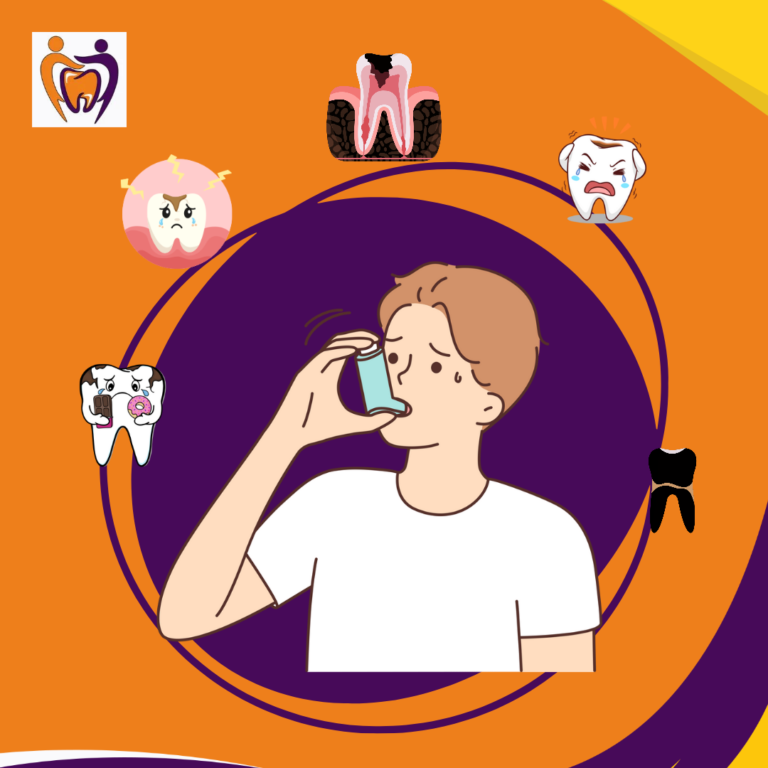As a dentist, I often meet patients who meticulously care for their teeth but still face oral health challenges. When I ask about their medical history, a common condition sometimes emerges—asthma.
Asthma is a chronic respiratory condition, but its impact extends far beyond the lungs. Let’s talk about how asthma affects your oral health and, more importantly, what you can do to protect your smile.

Asthma’s Hidden Effect on Oral Health
Asthma isn’t just about difficulty breathing; its treatments and side effects can create the perfect storm for oral and dental health problems. Here’s how it happens:
- Dry Mouth (Xerostomia)
Do you ever feel that your mouth is dry after using your inhaler? That’s because many asthma medications, particularly corticosteroids, reduce saliva production. Saliva is your mouth’s natural defense—it washes away food particles, neutralizes acids, and keeps your teeth strong. Without enough saliva, your mouth becomes a dry environment where bacteria thrive, leading to cavities and gum disease. - Mouth Breathing
Asthma often forces the person to breathe through their mouths, especially during their sleep. This habit dries out the oral tissues and gums, making them more susceptible to inflammation and infection. - Acidic Medications and Dental Erosion
The medications you rely on to breathe easier may have acidic properties that gradually erode your tooth enamel. Over time, this can lead to sensitivity and make your teeth more prone to further decay.
Why Asthma Patients Are More Vulnerable to Dental Problems
Research studies have shown that children and adults with asthma are at a higher risk of dental caries (cavities) compared to non-asthmatic individuals. It’s not just the medications that contribute to this risk; behaviors and habits play a role too. For instance:
- Some asthma medications contain sugar to make them palatable, especially for kids.
- The fatigue of managing a chronic condition can lead to lapses in oral hygiene.
- Stress, a common asthma trigger, can also negatively affect oral health by reducing immunity and promoting gum inflammation.
Additionally, asthma patients are more prone to fungal infections like oral thrush (candidiasis) due to the immunosuppressive effects of corticosteroid medications.
What You Can Do to Protect Your Oral Health
The good news? There’s a lot you can do to minimize these risks without compromising your asthma treatment. Here’s my advice as a dentist:
- Rinse After Using Your Inhaler
Every time you use your inhaler, rinse your mouth with salt water to wash away any residue. This simple step can help prevent dry mouth and reduce the risk of fungal infections. - Stay Hydrated
Drink plenty of water throughout the day to combat dryness and stimulate saliva production. You can also chew sugar-free gum to keep your mouth moist. - Brush and Floss Diligently
Make brushing twice a day and flossing daily non-negotiable parts of your routine. Use a fluoride toothpaste to strengthen your enamel, and consider fluoride rinses for added protection. - Visit Your Dentist Regularly
Regular check-ups allow us to catch and treat problems early. Let your dentist know about your asthma and the medications you use so they can tailor your care accordingly.
Choose Sugar-Free Medications If possible, ask your doctor about sugar-free alternatives for your asthma medications.
What We Know from Research
Scientific studies support the connection between asthma and oral health. For example:
- A 2021 review in the Journal of Asthma confirmed that asthma patients have a higher prevalence of cavities due to dry mouth and medication side effects.
- Another study published in the American Journal of Epidemiology highlighted the bidirectional relationship between asthma and periodontal disease. Gum inflammation can worsen asthma symptoms, creating a vicious cycle.
- A longitudinal study investigated the influence of childhood asthma on dental caries development and caries risk factors among children with asthma and found that children who had used anti‐asthmatic medicines had higher caries experience and higher caries progression over 3 years in both primary and permanent dentitions.
- As a dentist, I’ve seen firsthand how addressing these challenges can improve not just oral health but overall well-being.
Asthma and Gum Health: A Two-Way relationship
Did you know that gum disease can make your asthma worse? The bacteria in infected gums release inflammatory molecules into your bloodstream, which may trigger or exacerbate asthma symptoms. Conversely, asthma’s inflammatory effects can weaken your gums and lead to periodontitis.
If you’re noticing bleeding gums, bad breath, or loose teeth, talk to your dentist right away. These may be early signs of gum disease, and addressing them can have benefits that extend beyond your smile.
Caring for the Whole You
Asthma is a part of your life, but it doesn’t have to harm your teeth and gums. By taking proactive steps, you can breathe easy knowing your oral health is in good hands.
Remember, we’re here to help. Your dentist and healthcare provider can work together to ensure that your asthma treatment and oral care go hand in hand. After all, a healthy smile is just as important as healthy lungs—it’s a reflection of your overall well-being.
Would you like to dive deeper into specific tips or hear about case studies where improved oral health made a difference for asthma patients? Let me know—I’m here to help you protect your smile and your health.
References:
- Samec T, Amaechi BT, Jan J. Influence of childhood asthma on dental caries: A longitudinal study. Clin Exp Dent Res. 2021 Dec;7(6):957-967.
- Baghani E, Ouanounou A. The dental management of the asthmatic patients. Spec Care Dentist. 2021 May;41(3):309-318.
- Thomas MS, Parolia A, Kundabala M, Vikram M. Asthma and oral health: a review. Aust Dent J. 2010 Jun;55(2):128-33.
- Tamiya H, Abe M, Nagase T, Mitani A. The Link between Periodontal Disease and Asthma: How Do These Two Diseases Affect Each Other? J Clin Med. 2023 Oct 25;12(21):6747.

